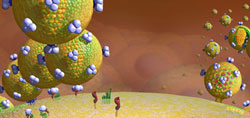In a late breaker, IAS 2019 also featured promising data on islatravir, known previously as MK-8591, the first drug in a new class of treatments known as nucleoside transcriptase translocation inhibitors (NRTTIs). The authors presented 48-week data from a Phase 2B, randomized trial in which islatravir was used as part of first-line therapy.
The study included 121 patients randomized to one of four study arms. In three of them, patients received different doses of MK-8591 together with 3TC plus doravirine, a new-generation, non-nucleoside reverse transcriptase inhibitors, for at least the first 24 weeks. After 24 weeks, patients in these arms who were virally suppressed switched to a two-drug combination of MK-8591 and doravirine.
In the fourth arm, patients received doravirine, 3TC and tenofovir for all 48 weeks, along with a placebo pill. After 48 weeks of treatment, rates of viral suppression were similar in all study arms, ranging from 78% to 90% in patients receiving MK-8591, and 84% in those on the three-drug combination without MK-8591. There were also fewer treatment-related adverse events on all of the MK-8591 arms. This study provides another promising sign – not only of the benefits of a new treatment, but also of the potential for a two-drug regimen.
References:
Molina et al. MK-8591 at doses of 0.25 to 2.25 mg QD, in combination with doravirine, establishes and maintains viral suppression through 48 weeks in treatment-naïve adults with HIV-1 infection. AbstractWEAB0402LB, 2019. http://programme.ias2019.org/Abstract/Abstract/4789
http://i-base.info/htb/36443
7/24/2019 6:44 PM
The Future: Islatravir
Source: Reporting from mexico City for PRN News: Bill Valenti, MD

